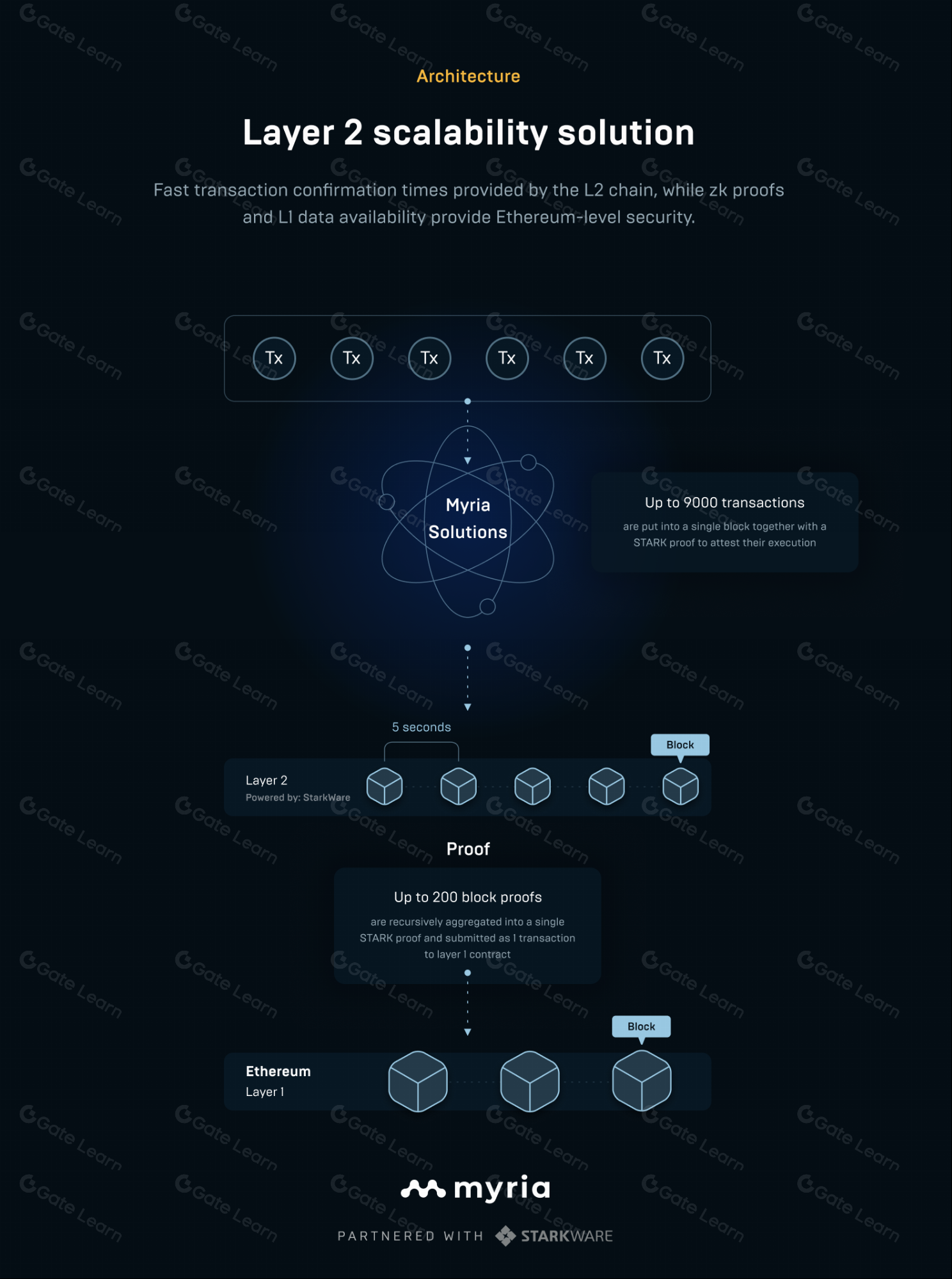La base technologique de MYRIA
Ce module présente en détail la solution de couche 2 de MYRIA, mettant l'accent sur les zk-Rollups, leur implémentation via zk-STARKs, ainsi que les avantages qu'ils offrent en termes de scalabilité, d'efficacité et de sécurité.
La solution Layer 2 de MYRIA

Myria en tant que solution Layer 2 (L2) sur Ethereum vise à résoudre les limites de la couche 1 (L1) d'Ethereum en améliorant l'évolutivité et en réduisant les coûts de transaction. Les solutions de la couche 2 sont des protocoles construits sur des blockchains existantes telles qu'Ethereum, qui traitent les transactions hors-chaîne pour alléger la charge de la chaîne principale, améliorant ainsi considérablement le débit des transactions et réduisant les coûts.
La capacité de traitement d'Ethereum L1 est limitée, avec une moyenne de 15 à 30 transactions par seconde (TPS). Cette limitation peut entraîner des congestions du réseau, des délais de transaction plus longs et une augmentation des frais de gaz pendant les périodes de demande élevée. Pour les applications nécessitant un grand nombre de transactions, telles que les jeux blockchain ou les marchés NFT, ces problèmes représentent un défi pour les développeurs qui cherchent à créer des solutions complexes.
La solution de couche 2 de MYRIA résout ces problèmes grâce à la technologie zk-Rollups. Les zk-Rollups sont une solution d'extension de couche 2 qui regroupe plusieurs transactions en une seule. Les transactions regroupées sont soumises à la blockchain Ethereum en tant que transaction unique, réduisant ainsi la quantité de données à traiter sur la chaîne à la fois. Cela permet non seulement de réduire les frais de gaz, mais également d'augmenter le nombre de transactions pouvant être traitées par seconde.
Explication détaillée de la preuve à divulgation nulle (ZKP)

La preuve de connaissance nulle (ZKP) est une méthode de cryptographie qui permet à une partie de prouver à une autre partie la véracité d'une déclaration sans révéler aucune autre information. Dans le contexte des zk-Rollups, ZKP est utilisé pour vérifier que toutes les transactions dans le Rollup sont valides, sans avoir à traiter individuellement chaque transaction sur la chaîne.
Myria utilise zk-Rollups et des preuves de connaissance transparentes et extensibles à zéro connaissance (zk-STARKs). Contrairement à d'autres systèmes de preuve à connaissance nulle (tels que zk-SNARKs), zk-STARKs ne nécessitent pas de configuration de confiance, c'est-à-dire dans certaines phases de création de systèmes cryptographiques, la génération des paramètres et leur distribution aux participants. De plus, zk-STARKs offrent une sécurité post-quantique, ce qui signifie qu'ils peuvent résister aux attaques des ordinateurs quantiques.
Les avantages concrets de Myria zk-Rollups
Myria peut traiter jusqu'à 9 000 transactions par seconde en utilisant la technologie zk-Rollups, sans frais de gaz. Cette capacité de traitement est essentielle pour les applications nécessitant un traitement rapide et efficace d'un grand nombre de transactions, telles que les marchés NFT et les jeux blockchain.
En empaquetant les transactions hors chaîne et en les soumettant à Ethereum en tant que transaction unique, Myria peut s'étendre pour répondre aux besoins des utilisateurs sans compromettre la sécurité ou la décentralisation.
Outils de développement et SDK
Myria fournit un ensemble d'outils simplifiant le développement de la blockchain. Myria Core SDK et diverses API offrent aux développeurs la possibilité de créer, forger et gérer des actifs numériques sur le réseau Myria. Ces outils abstraient la complexité du développement de la blockchain, permettant aux développeurs de construire des applications sans avoir à maîtriser en profondeur la technologie des contrats intelligents.
Point clé
- Myria utilise une solution de couche 2 basée sur zk-STARKs pour une évolutivité et des frais de gaz nuls.
- La plateforme prend en charge jusqu'à 9 000 transactions par seconde (TPS) et offre un niveau de sécurité comparable à celui d'Ethereum.
- Les outils de développement de Myria, y compris le SDK Core, simplifient le processus d'intégration de la blockchain.
- Le marché et le portefeuille Myria soutiennent la sécurité et la gestion pratique des actifs numériques.
- L'architecture de MYRIA garantit la décentralisation, la sécurité et une expérience conviviale pour les développeurs et les utilisateurs.





